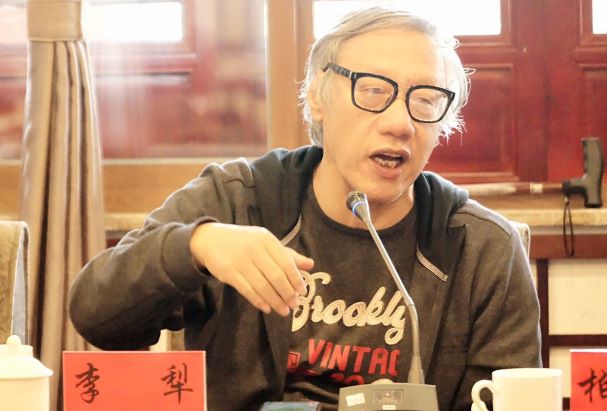
The Long March of Chinese Poetry is a long march of poetry. It will act and live the abstract and indescribable poetry, and push marginal poetry back to the public and to a boiling life. What's more meaningful is that Wan Lixing wrote about people and things that the poet experienced. His works obviously lacked the mystery and stiffness, but more freshness and spirituality. What came out was the breath of people and the taste of life. The Long March of Chinese Poetry let the poetry go out of the lifeless ivory tower, and return to the earth, the side and the soul from the ethereal nothingness. Poetry writing has finally returned to the source and roots of poetry, and that is what we often say about the situation and emotion. I regard this way of writing and style as "Wanlixing style". Its value lies in reshaping and consolidating the spirit and temperament of the aesthetics of local poetry, reducing the heavy physical and mental burden of poetry, and letting the spirit of Xiao Kuiling (short, flat and fast) traditional poetry reach the hearts of the people.
Specifically, "Wanlixing style" has the following characteristics:
1. Timely. The immediacy of poetry is focused on timeliness, which is poetry on the spot. The poet wiped his shoulder from life, and the poem appeared. Poetry is no longer far away, poetry is now, just in front of you. The poem is near, and the water and spirit are alive, not only avoiding the mutual copying of the text, but from the poem you can see the life that is happening, the life that is steaming, and you, me and him are in it. Life and poetry are fully integrated.
2. Materialism. Emphasize that poems must have content, be useful, and be very specific. Transitivity is materialism, there is something, meaning and meaning, the distance between words and meaning is zero, not circumventing, not separated, not false, seeing the truth and the truth, as well as the true scenery of true feelings. Transitive poetry refuses to be big and empty, but small and true. It does not pursue deepness, but focuses on being tangible and understandable. What is said is what the poem says.
3. Emotion. Poetry is sentiment and sentiment. Emotion is the source of poetry and the end of poetry. A deeper step is the ancients' cloud: "Poets, human temperament, there is no poetry outside temperament". He is angry with poems, and sees poems like faces. There is temperament in the poem, just like body has qi, eyes have god, life has breath, poetry has tainted humanity, with tone and soul, Wanlixing firmly refuses the indiscriminate poems of ruthless false feelings hypocrisy hypocrisy. .
4. Expression. Past poems can be recited and sung. The current poems are hard to read and hard to understand. Wanlixing style advocates restoring the reading function of poetry, letting the poetry return to the tongue and ears, blurting out and understanding immediately. Let the poetry be resurrected, grow and beautify in the sound. To do this, it requires oral writing and learning the essence and rhythm of the song. Therefore, Wanlixing refused to use the prestigious and profound guessing and provocative writing methods.
5. Taste. Poetry must have a taste, the taste of poetry is rhyme, it contains meaning, sentiment, umami, and fun. The point of Guizong is that it has a chewy head and an aftertaste. This is the appeal of the work, that is, the artistic conception in traditional poetry. The intention is in the scene, and there is emotion in the scene, and the intention and emotion are endless. The meaning of artistic conception is the aftertaste, like the ending of the song and the aftertones are lingering and lingering. When it comes to writing, it is simple and simple, and the affection is profound.
These claims are not the originality of Long March of Chinese Poetry, but the spirit and essence of traditional Chinese poetry. The ancient poet was the mentor of Wanlixing, such as Li Bai. His poems were not written (contemplative), but were "executed". His hundreds of poems are not repeated, and they are different from others. After traveling thousands of miles, I met thousands of different landscapes and characters. He does not pursue the immortality of poetry, but has a permanent impact due to the vividness of the scene; he does not pursue broad and profound, but because every sentence is the blood and flesh peeled off from the soul, so that poetry has eternal The charm that does not disappear. Poetry is qi, not an instrument, poetry is a human heart, not an object; poetry must have spirit and spirit, not a mummy. Therefore, Wanlixing style must learn the spirit and way of Li Bai's traveling thousands of miles, writing thousands of acres of poetry, and touch the porcelain in the real world to gain great impulse, great passion, and great inspiration, so that it is possible to write the truth. Poetry with great emotion!
————
Li Li, whose real name is Li Yusheng, is from Liaoning, a famous poet and poet critic. Deputy Secretary-General of Long March of Chinese Poetry Organizing Committee, Vice Chairman of the World Scenic Poetry Tourism Alliance, Vice Chairman of Liaoning New Poetry Society, Executive Editor-in-Chief of Shenzhen Poetry Journal, Special Editor-in-Chief of Mammoth Poetry Journal. Published poems "Big Wind", "Black Poppy", "Twenty-four Songs in a Village", literary criticism collection "Cooking Poems" and "Rejection of Eternity", poetry research collection "Nowhere in Heaven-Psychological Analysis of the World Suicide Poet"; The poetry collection "Cooking Poems" won the third Liu Zhang Poetry Award, and several awards for poetry and criticism.
Click to enter the Chinese version(点击阅读中文版)